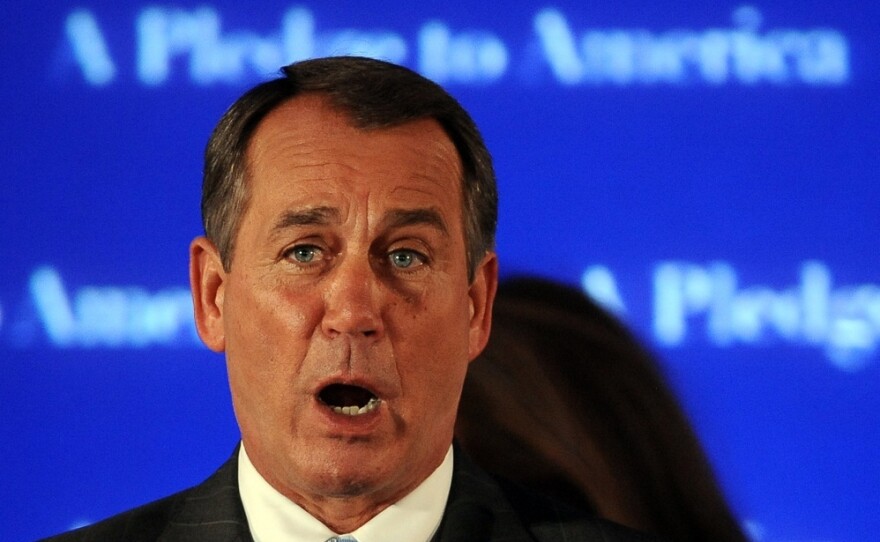Republicans regained control of the House on Tuesday in part with a pledge to "repeal and replace" the new health law. But carrying out that campaign promise won't be as easy as making it was.
"Republicans cannot repeal Obamacare with President Obama wielding the veto pen," says Michael Cannon, director of health policy studies for the libertarian Cato Institute. "I mean that's not within a set of possible outcomes."
That's because as large as the new GOP majority will be come January, it's still not large enough to override a presidential veto. In addition, the Senate will still be controlled by the Democrats, who are unlikely to go along with the repeal effort.
But Cannon, who is no fan of the new law, says House Republicans are not without weapons to do battle with the measure. "They're going to do everything they can to try to cripple the law, throw sand in the gears and make it even more unpopular than it has been for the past 18 months," he says.
One major way they can do that is by holding oversight hearings. Using subpoena power if necessary, Republicans could end up forcing Obama administration health officials to spend nearly as much time on Capitol Hill as they do in their offices actually trying to implement the law.
Cannon says a barrage of hearings and investigations by Republicans could help solidify public opinion against the measure. "The more they keep the law in the news and the more of a steady drumbeat of bad news they create about this law, the more likely it is that eventually someone with the power to overturn or repeal this law will do so," he says.
Threats Could Backfire
But all those hearings could also have the opposite effect -- giving the administration a chance to make its case in favor of the law, a case that often got drowned out during the election campaign.
[Republicans are] going to do everything they can to try to cripple the law, throw sand in the gears and make it even more unpopular than it has been for the pass 18 months.
"The next round of this, while there will continue to be the broad sloganeering on both sides, will presumably get a little bit more into the detail," says Martin Corry, a health care lobbyist and former official at the Department of Health and Human Services during the Bush administration. "So if you're a family with a 22 year old still in college, you may not want to see that provision [that lets grown children stay on their parents' health plans] repealed."
Corry says other threats -- such as trying to starve the new law by holding back its funding or preventing agencies from writing regulations needed to implement it -- could also backfire.
That's because, he says, "many provisions in the law take effect, regulations or not, implementation dollars or not," so simply cutting off the money or the regulations could end up leaving those who must still comply with the law with even less certainty about what they should do.
Former Republican Sen. Dave Durenberger of Minnesota says he thinks the Democratic-led Senate could try to dampen the House repeal efforts by holding a series of hearings of its own. Among other things they could give health care groups a chance to tell Congress what things in the law they want to see fixed.
"And just putting that 'here are some things that could be improved' on the table, takes some of the wind out of the sail for repeal," Durenberger says.
At a news conference Wednesday, President Obama signaled he was open to some changes to the health law. He even suggested one of his own -- repealing an unpopular provision increasing the number of 1099 forms small businesses must file with the IRS.
"It was designed to make sure that revenue was raised to help pay for some of the other provisions," the president said, "but if it ends up just being so much trouble that small businesses find it difficult to manage, that's something that we should take a look at."
Copyright 2022 NPR. To see more, visit https://www.npr.org. 9(MDAzMjM2NDYzMDEyMzc1Njk5NjAxNzY3OQ001))






